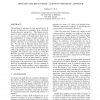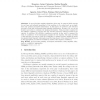89 search results - page 7 / 18 » Using Quasiarithmetic Means in a Sequential Decision Procedu... |
WSC
1997
13 years 8 months ago
1997
The problem of selecting the best system from a finite set of alternatives is considered from a Bayesian decision-theoretic perspective. The framework presented is quite general,...
PAMI
2002
13 years 7 months ago
2002
We introduce a formalism for optimal sensor parameter selection for iterative state estimation in static systems. Our optimality criterion is the reduction of uncertainty in the st...
ISCI
2006
13 years 7 months ago
2006
In this paper we have introduced a class of decision rules related to simple majority, by considering individual intensities of preference. These intensities will be shown by mean...
JUCS
2010
13 years 5 months ago
2010
: In group decision making situations, there may be cases in which experts do not have an in-depth knowledge of the problem to be solved and, as a result, they may present incomple...
AIPS
2006
13 years 8 months ago
2006
We view dynamic scheduling as a sequential decision problem. Firstly, we introduce a generalized planning operator, the stochastic task model (STM), which predicts the effects of ...



